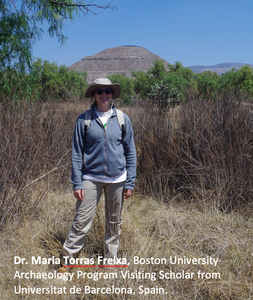Archaeology Program Researcher Spotlight – Dr. Maria Torras Freixa
Archaeology Program Researcher Spotlight
Dr. Maria Torras Freixa
Dr. Torras Freixa is a Visiting Research Scholar from Universitat de Barcelona, Spain in the Archaeology Program at Boston University. She is doing research with Dr. David Carballo on her project, Living in the ruins of the city of Teotihuacan, Mexico led by Dr. Natalia Moragas and Dr. Alessandra Pecci .
What are you looking forward to the most while here at BU? Teo
I came to BU to learn and share thoughts with Prof. David Carballo, one of the leading active scholars working in Teotihuacan and particularly interested in governance strategies. As well, I wanted to come to BU to experienced new research and teaching methods different from the Spanish system.
strategies. As well, I wanted to come to BU to experienced new research and teaching methods different from the Spanish system.
Where are you from? Is this your first time in Boston? How are you liking it so far?
I’m from Barcelona, Spain, and this is my first time in Boston, actually in the United States. I really love Boston, because it’s so beautiful, quiet and people are very nice. You can have an interesting conversation in the most unexpected place, such as in line at the grocery store, and learn more about Bostonians and the city’s culture.
What are some of your interests and hobbies? What do you like to do in your spare time?
One of my interests is to try new restaurants. Food and sharing time eating it’s a very cultural act. As I come from the Mediterranean these moments are essential for us and are part of our daily happiness. As well, I like to get lost in cities without any map, just walk around and discover hidden and new spots. Also, sports, theatre and museums are part of my free time. In a few words, I’m a person that enjoy cities discovering peculiarities of each neighborhood.
Tell me about your research interests. What did you work on previously?
Cities are something that attract me, not only in my free time but also as one of my research interests. I conceive cities as one of the tangible expressions of a complex society where the traces of the inhabitants’ interactions can be interpreted from individual stories to macroscale approaches. My main focus is on ancient urbanism, mainly in Highland Central Mexico and particularly on the prehispanic city of Teotihuacan. My previous work was to study the early urbanization process of Teotihuacan, in order to understand how and when the city achieve its uniqueness and the political mechanisms involved, but more important to analyze what this process meant in people lives.
What is your current research project about?
My current research project is about how do you lived in an abandoned city and the deurbanization process. The project is led by the University of Barcelona in an interdisciplinary environment. Rather than looking for the reasons behind the great crisis that befell the Teotihuacan culture, we are working on the moment in which the process of collapse was fully accomplished, and the city was redesigned in a very different sociocultural and economic system by their new settlers, specifically from the Epiclassic period (650-900 CE) to the Early Colonial times (16th and 17th centuries). Thus, the aim is to understand the resilience, perception of and living in the remains of the city of Teotihuacan.
How did you become interested in archaeology?
I don’t really know how or why, but since I was 10 years old I’ve wanted to be an archeologist. From that memory until now, I’ve realized that what fascinates me is the complexity of the human being and its different expressions of a same behavior embedded in material remains transculturally and diachronically in time.
Is there a particular experience or memory from your time as a PhD student that stood out to you?
I really enjoyed my period as PhD student, and my favorite memory was the defense of the dissertation.
What would your advice to undergraduate students be, and to graduate students:
My advice to undergraduate students would be to use their time to take courses of whatever they are excited about, even if they are not related with their main discipline. Sometimes, you can discover new passions or new approaches which complement your studies. For graduate students, I would say don’t be afraid if the path to the goal isn’t a straight line, just keep in mind what you want to do, and go for it.
What are your future plans? What do you plan to do when you leave BU?
My future plans after my ongoing project will be to find another fellowship as a postdoctoral researcher. I want to experience internationalization, research network and different theoretical approaches to enrich my research.